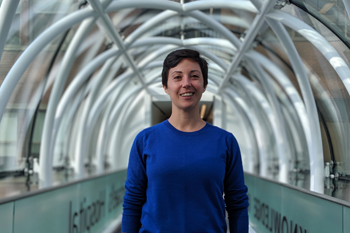Clinical ethics: Navigating a bumpy road towards the right path

Jamie Robertson, clinical ethicist
Often in health care, it’s not always clear what the right decision is. There are issues such as families struggling with the decision to withdraw treatment for a loved one approaching end of life, or a clinician debating whether it’s right to discharge a patient who has demonstrated a negligence of their own care.
That’s where a clinical ethicist like Jamie Robertson comes in.
“I help make sure people process all the information available and are cognizant of the values that are revolving around that information to then make a decision that is morally good and morally justified,” said Robertson.
“My role is to help people structure their thoughts – to think in a structured way about the problems they’re encountering.”
Robertson officially joined Unity Health Toronto’s Centre for Clinical Ethics as a clinical ethicist late this summer after completing a yearlong fellowship at the centre.
Clinical ethics promotes reflective practice and the making of “right” choices and decisions in the delivery of health care. A clinical ethicist will collaborate with health care teams, patients and family members to explore the reasons given to their choices and actions.
After pursing her master’s degree in philosophy, Robertson landed in Sudbury working in community outreach at an ethics centre. The experience of working to help the community understand the issues driving homelessness and to create more compassion for those experiencing disadvantage served as the inspiration for her to pursue a doctorate in philosophy and a career in health care.
“I really value the ability to apply my philosophical knowledge about theories of right and wrong, what makes something a good thing to do versus about a bad thing to do, what makes a good life versus a less good life, if that is a thing — and trying to actually make that relevant to the community I am in,” she said.
Robertson describes working in health care as a constant learning experience, and its challenge is often in the ambiguous nature of what is “right.” While cases may appear similar on the surface – with patients around the same age or with the same condition – the more nuanced, underlying factors can make the best path forward very different for each case.
In addition to providing consultative services to patients, families and staff, Robertson and the Centre for Clinical Ethics team offer education sessions, develop and review policy, sit as members of the St. Michael’s Hospital Research Ethics Board and conduct research of their own.
The diversity in the people she meets, their stories and the different scenarios she works with excite Robertson, and it’s the feeling of helping people that’s most gratifying about her work.
“I like helping health care workers feel they’re achieving what they’re trying to do, and patients and families feel heard or have a good encounter with the health care system,” she said.
“I like to help encounters go smoothly when perhaps there’s a bit of a bumpy road.”
About St. Michael’s Hospital
St. Michael’s Hospital provides compassionate care to all who enter its doors. The hospital also provides outstanding medical education to future health care professionals in more than 27 academic disciplines. Critical care and trauma, heart disease, neurosurgery, diabetes, cancer care, care of the homeless and global health are among the Hospital’s recognized areas of expertise. Through the Keenan Research Centre and the Li Ka Shing International Healthcare Education Centre, which make up the Li Ka Shing Knowledge Institute, research and education at St. Michael’s Hospital are recognized and make an impact around the world. Founded in 1892, the hospital is fully affiliated with the University of Toronto.
About Unity Health Toronto
Unity Health Toronto, comprised of Providence Healthcare, St. Joseph’s Health Centre and St. Michael’s Hospital, works to advance the health of everyone in our urban communities and beyond. Our health network serves patients, residents and clients across the full spectrum of care, spanning primary care, secondary community care, tertiary and quaternary care services to post-acute through rehabilitation, palliative care and long-term care, while investing in world-class research and education. For more information, visit www.unityhealth.to.
By: Jennifer Stranges
